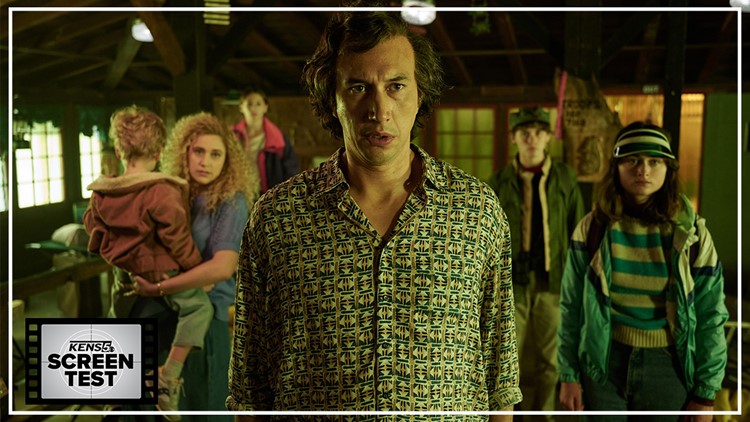TEXAS, USA — The first thing you notice are the colors, bright yellows and reds and blues more befitting of a network sitcom than the latest work from an Oscar-nominated filmmaker whose domestic stories typically bear a muted palette. It’s the dialogue that tends to pop! in a Noah Baumbach picture, after all, not the production design.
But as anyone familiar with the 1985 Don DeLillo novel Baumbach brings to the screen (and to Netflix this week) would tell you, “White Noise” – a stew of campus satire, marriage drama and disaster movie – represents the most radical departure of the director’s career, even as parts of this haphazard film zero in on the familial dynamics that drive his “Marriage Story,” “The Squid and the Whale” and “The Meyerowitz Stories.” The difference is that the quiet parts of those films are said out loud in “White Noise,” an existentially inclined family drama in which family conversations tread much more pleasant terrain than the minefields of those other movies.
Perhaps too pleasant? In the world occupied by Jack (Adam Driver), Babette (Greta Gerwig) and the half-dozen or so kids they’re raising, bold set designs that bring to mind grocery ads and bubbly ‘80s music videos are merely visual echoes of daily rituals so sanitized that they feel borderline dystopian. Consumerism leads the day and college lecture halls look like daycares. Everything in the world of “White Noise” is played with optimism, fancy or varying degrees of “Now now, you guuuys.” Even when Jack and Babette's idea of an evening nightcap is wondering who will die first, their words are colored with an eyebrow-raising curiosity. Everyone is playing their roles. Aside from some concerns about Babette taking mysterious pills, everything is in its place. It isn’t until a so-called “toxic airborne event” tilts things into the direction of disasterdrama that bright colors are replaced by shadows and streaks of purple lightning, “White Noise” applying the language of Spielberg to emphasize things we already suspected earlier on.
The film’s price tag reportedly surpasses $100 million. In a movie featuring one of our most interesting leading men in Driver and its writer-director’s penchant for crafting immensely satisfying set pieces out of dialogue, it’s that particular nugget that comes to be the most fascinating thing about “White Noise.” Baumbach and nine-figure budgets are as incomprehensible a pairing as Michael Bay and Nicholas Sparks, so you’d be forgiven if your curiosity was rooted in what the movie looks and sounds like rather than what we're seeing or what characters are saying.
Baumbach is unable to forge a compelling argument otherwise, though a movie that sometimes plays like the distracted lovechild of “Inside Out” and “Force Majeure” will inevitably scratch out a couple halfway-moving ruminations about the entrapment of a life that only seems perfect from the outside. On a scene-to-scene basis, “White Noise’s” fairly effective first half is carried by the dry comedy of his script and the uneasy sense that what we’re seeing is the product of some simulation. But there’s almost no use investing in characters we’ve seen far more captivating versions of in Baumbach’s previous movies.
I couldn’t confidently tell you much of what happens over the movie’s full runtime, mostly because the film’s sentiments are taken so deeply for granted that it’s hard to feel Baumbach’s own grasp on them. He struggles to weave a potpourri of three-quarters-baked ideas – confronting mortality, the ostensible comforts of staying in your lane, the role of the media – into anything as memorable as the image of a family packed into a car and trying to escape an ecological crisis. You might be surprised by how small a slice of the runtime that drama takes up, and if anything it’s strong evidence that there’s more dimension to Baumbach as a director than we might’ve realized when it’s the writing that tends to draw us to his work.
The bigger disaster in “White Noise,” in turns out, is far more slow-onset than the railroad collision that spurts toxin into the air. It concerns the eventual end of some things, the exaggerated importance of others; Jack and Babette have a third-act standoff amid a breakdown of the roles they've played for years, and you can almost feel a pang below surface-level amusement. But Baumbach’s absurdist lens grows exhausting over 135 minutes, and by the end Jack and Babette appear to have woken from a mildly disturbing dream rather than learned anything about themselves. “White Noise” is enjoyably preposterous, and preposterously rote.
"White Noise" is rated R for brief violence and language. Now streaming on Netflix. Runtime: 2 hours, 16 minutes.
Starring Adam Driver, Greta Gerwig, Don Cheadle, Madison Gaughan
Directed by Noah Baumbach; written by Baumbach, based on the novel by Don DeLillo
2022
---
MORE REVIEWS:



